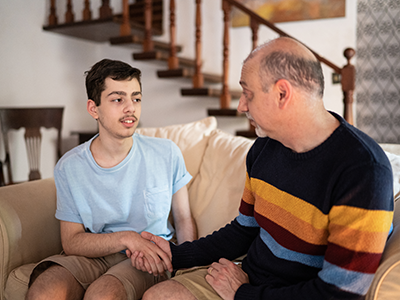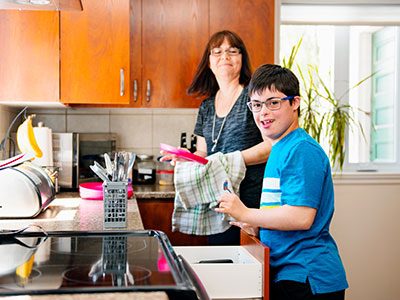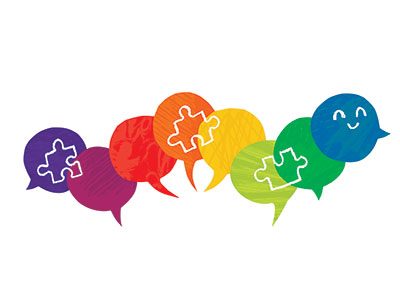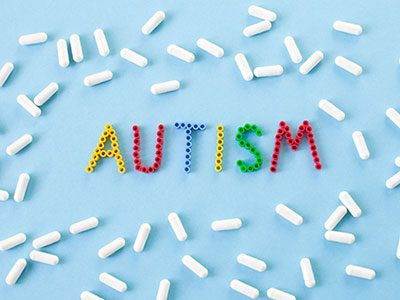My partner and I have a 2-year-old who has been assessed but not formally diagnosed with autism spectrum. One of the key things is he cannot and will not communicate verbally. He just screams and shouts at everything from 4am until nearly 11pm many nights. He has no volume control and he bangs his head against things very aggressively. The big problem is the use of the head to injure people by headbanging violently on them. My partner is often able to sleep through this, but since I am a light sleeper, I often only get a few hours of sleep a night. Are there any techniques or advice to help with the sleeping or to manage the screaming and violent behaviors? We are afraid he will need to start wearing head protection soon as he gets stronger and heavier.
This is such a difficult and stressful situation for your family. First and foremost, it’s great that you are already working with a team to better understand what is driving these challenging behaviors for your child. Please be sure you are keeping your child’s pediatrician and assessment team aware of the difficulties he is having, so that they can help refer you to the appropriate medical and behavioral health providers. Your child likely qualifies for early intervention services, which can be an important source of support.
Children with developmental disabilities tend to be more easily overwhelmed and upset than typically developing children. Many of these children have sensory processing difficulties that make them more sensitive to sounds, lights or sensations. They often have a much harder time dealing with changes, even small changes that we as parents might not even notice. They also struggle to understand what is going on around them. On top of all this, many of them, like your son, have significant difficulties communicating in ways that we can understand. Often self-injurious behavior, like head-banging, is driven by these challenges in communication, so finding ways to help your son communicate can be key. My first piece of advice to parents when their child is overwhelmed and having a “meltdown” like this is to stop talking. Our first instinct as parents is to talk to our children, ask them what’s wrong, and reassure them. However, children with developmental disabilities often find language stressful, and we end up making things worse. You can try offering him simple choices without speaking — for example, offering a snack or drink, a comforting toy or blanket or extending your arms for a hug. Sensory strategies, like deep pressure hugs, weighted blankets, noise-cancelling headphones or gently brushing can also help children calm down.
Settling down to sleep can also be particularly difficult for children with developmental disabilities, and that may be a factor if you’re noticing this most at night. Good sleep strategies for all children include:
- make sure to build physical activity into your day
- stop using electronic devices at least 1 hour before bed
- begin calming activities as bedtime nears
- follow a consistent bedtime routine every night
- offer a small snack close to bedtime.
It’s also possible that your son has some physical discomfort or medical condition that is interfering with his sleep. Your pediatrician can check to make sure he is medically healthy and help you determine whether consultation with a sleep medicine specialist might be appropriate.
Lastly, you shared that your child is suspected to have autism spectrum disorder (ASD). Many children with ASD benefit from working with a team of specialists, including speech/language pathologists, applied behavioral analysis (ABA) therapists, developmental pediatricians, psychologists, psychiatrists and occupational therapists, as well as special educators at school. The challenges you are experiencing are incredibly difficult and complex to handle on your own as a parent. Please do reach out to your child’s team for individualized recommendations about the professional specialists who may be able to directly support your family in understanding your child’s challenges and helping him to calm down safely when he is overwhelmed.
 https://riseandshine.childrensnational.org/wp-content/uploads/2026/02/olympics-feature.png
300
400
webteam
https://riseandshine.childrensnational.org/wp-content/uploads/2017/11/childrens_riseandshine_logo.jpg
webteam2026-02-05 16:41:512026-02-06 08:51:52What the Winter Olympics can teach our children
https://riseandshine.childrensnational.org/wp-content/uploads/2026/02/olympics-feature.png
300
400
webteam
https://riseandshine.childrensnational.org/wp-content/uploads/2017/11/childrens_riseandshine_logo.jpg
webteam2026-02-05 16:41:512026-02-06 08:51:52What the Winter Olympics can teach our children





















Hello, I am an Early Chilhood Senior Inspector. A lot of parents and teachers are coming to me for assistance with their children diagnosed with Autism Spectrum disorders. I have very limited information in this subject. I hold PhD in Early Childhood Education, Masters in Educational Psychology, and Bachelor in Psychology and Human Resources Management. Please help.me to help my community. I am from Eswatini/Swaziland
thnks for help